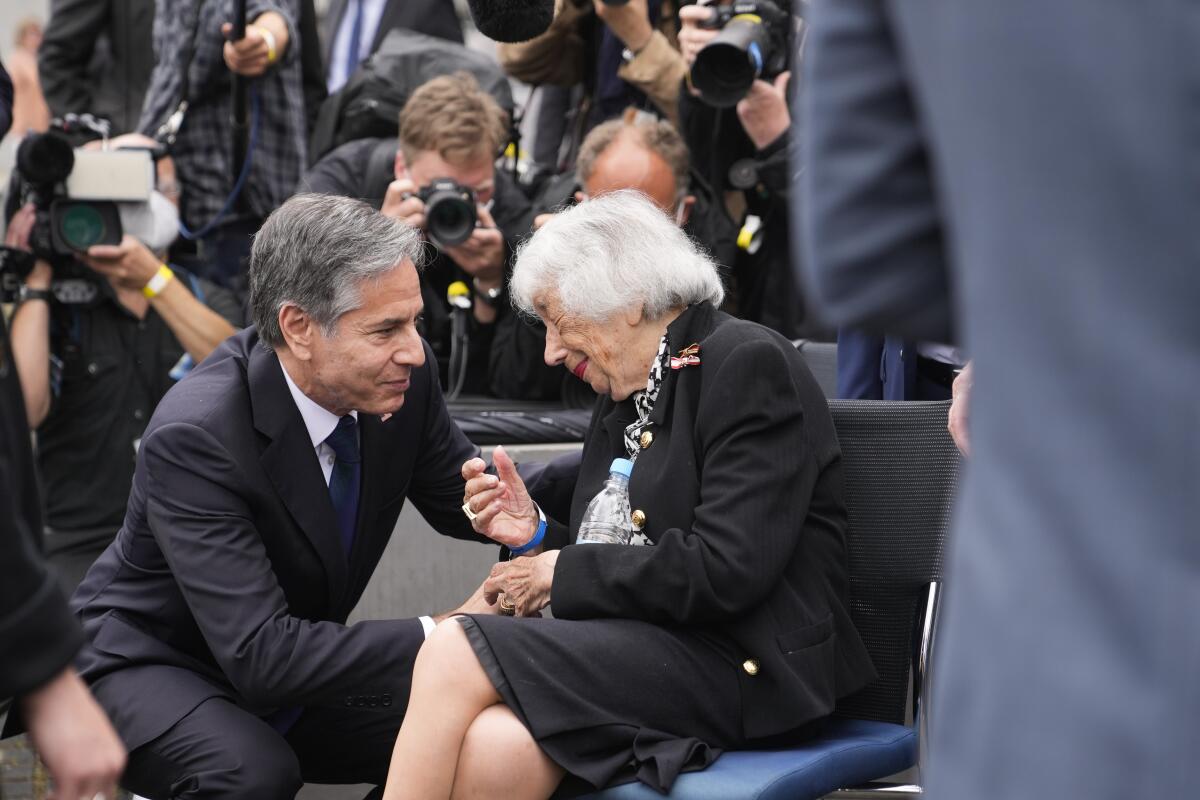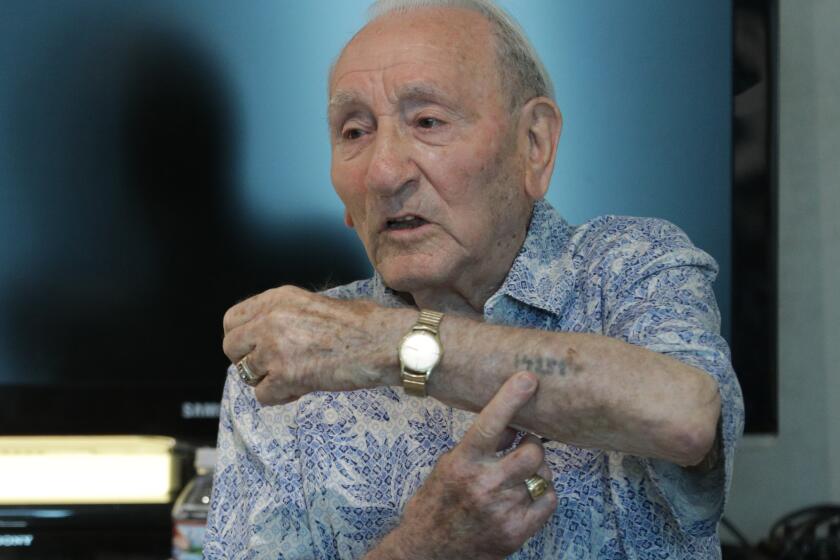In Germany, Blinken joins initiative to combat Holocaust denial and ignorance

BERLIN — Margot Friedlander survived the Nazis’ labor camps in Germany, and then the pain of widowhood. In her 80s, she finally began to write down her memories so that no one would forget what happened in her native land nearly a century ago.
On Thursday, hours after the 99-year-old told her story in a ceremony marking a new U.S.-German initiative to educate people about the Holocaust, a visibly moved Secretary of State Antony J. Blinken asked for, and received, a copy of Friedlander’s memoirs to read on the flight back to Washington, an aide said.
For the record:
4:02 p.m. July 14, 2021An earlier version of this story incorrectly stated that Secretary of State Antony J. Blinken spoke of Bialystok, Poland, residents burning synagogues and rabbis’ beards before World War II. Blinken was speaking of invading Nazi forces’ actions during the war.
Blinken is in Berlin as part of a swing through Western Europe aimed at shoring up the United States’ transatlantic relationships after the rocky years of the Trump administration. The visit follows President Biden’s recent trip to Europe, during which he assured North Atlantic Treaty Organization nations of Washington’s support and solidarity.
In Berlin, Blinken added a stop at the city’s striking Memorial to the Murdered Jews of Europe, a 200,000-square-foot landscape of 2,711 concrete blocks of various sizes commemorating the millions of Jews killed during the Nazis’ reign of terror. Scholars say Germany has led the way in accepting responsibility for the Holocaust while other countries, such as Austria and Poland, remain more evasive about their citizens’ roles in the Nazi-ordered genocide.
“We are helping to ensure that current and future generations learn about the Holocaust and learn from it,” Blinken said of the new U.S.-German initiative, which includes a series of educational and training programs aimed at debunking fear of “the other” and fostering understanding of different cultures.
“Today, as in the past, Holocaust denial and other forms of antisemitism often go hand in hand with homophobia, xenophobia, racism, other hatred. It’s also a rallying cry for those who seek to tear down our democracies, which we’ve seen in both our countries is often a precursor to violence,” he said.
Noting the rise in antisemitic rhetoric and attacks during the COVID-19 pandemic, Blinken warned that the descent into something as ugly as Nazism is “not a sharp fall” but a “gradual descent into darkness.”
He spoke of the plight of Jews in Bialystok, Poland, where bigoted residents burned the beards of rabbis and torched synagogues long before World War II and the Holocaust. Then he recalled his stepfather’s family, whose members were rounded up in Bialystok and dispatched to death camps.
Only one boy survived. He would become Blinken’s stepfather.
Joseph Alexander, 96, a slight man with a Polish accent, wearing a Hawaiian shirt, spoke on a sunny Sunday to a rapt crowd of about 30 at the Los Angeles Museum of the Holocaust.
Blinken said many in society refused to speak out against the rise of Nazis and the persistent, systematic attack on Jews.
“The evil was visible,” Blinken said. “Everyone in those cities knew that Jews lived there. They knew the trains were leaving, packed with people day after day.... Most chose to look away, to do nothing.”
Friedlander, with a full head of carefully combed white hair and meticulously applied bright red lipstick, told the story of arriving home in January 1943, like any day, to find her mother and brother had been hauled away by Gestapo thugs. She would never see them again, yet described a life of “luck” because she was hidden by neighbors for a year and eventually was shipped off to a work camp instead of a death machine.
She worked at the Theresienstadt concentration camp in what is now the Czech Republic until Allied forces liberated it and other camps in 1945. Soon after, a train arrived bearing men from Dachau, so emaciated and beaten they were “no more human,” she said. Among them was the man who would become her husband.
The couple moved to the U.S. After her husband’s death, Friedlander realized she had a story to tell and began writing books and going on speaking tours.
“We will not be on with a life ... much longer, and it is for them [her audiences] that it should never happen again, that I don’t want anyone to experience what has been done to the 5 million Jews and millions of other innocent humans,” she said Thursday to Blinken and the small gathering.
“I tell them that there is no Christian, Jewish or Muslim blood — that there’s only human blood. We are all the same, that people did it because they did not respect humans. Please, be a human being.”
More to Read
Sign up for Essential California
The most important California stories and recommendations in your inbox every morning.
You may occasionally receive promotional content from the Los Angeles Times.












